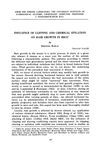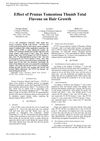 209 citations,
September 2008 in “Dermatologic Therapy”
209 citations,
September 2008 in “Dermatologic Therapy” Androgens can both increase and decrease hair growth in different parts of the body.
 205 citations,
March 2012 in “Science Translational Medicine”
205 citations,
March 2012 in “Science Translational Medicine” PGD2 stops hair growth and is higher in bald men with AGA.
 April 2004 in “Inpharma Weekly”
April 2004 in “Inpharma Weekly” Melatonin helps hair growth in women with hair loss issues.
 87 citations,
March 2005 in “Journal of Dermatological Science”
87 citations,
March 2005 in “Journal of Dermatological Science” Asiasari radix extract promotes hair growth and increases protein synthesis and cell proliferation.
 66 citations,
August 2001 in “Experimental Dermatology”
66 citations,
August 2001 in “Experimental Dermatology” Human hair follicle cells can grow hair when put into mouse skin if they stay in contact with mouse cells.
 54 citations,
June 2003 in “The journal of investigative dermatology. Symposium proceedings/The Journal of investigative dermatology symposium proceedings”
54 citations,
June 2003 in “The journal of investigative dermatology. Symposium proceedings/The Journal of investigative dermatology symposium proceedings” Disruptions in hair follicle fibroblast dynamics can cause hair growth problems.
 52 citations,
September 2018 in “International Journal of Molecular Sciences”
52 citations,
September 2018 in “International Journal of Molecular Sciences” Ginseng and its compounds may help hair growth and prevent hair loss, but more human trials are needed to confirm this.
 46 citations,
May 1986 in “Seminars in Reproductive Medicine”
46 citations,
May 1986 in “Seminars in Reproductive Medicine” Testosterone and dihydrotestosterone affect hair growth, and new techniques like the folliculogram help study it, but fully understanding hair growth is still complex.
 18 citations,
April 2019 in “Archives of Dermatological Research”
18 citations,
April 2019 in “Archives of Dermatological Research” Lactoferrin helps mice grow hair by increasing cell growth and hair follicle development.
 14 citations,
February 2021 in “International Journal of Pharmaceutics”
14 citations,
February 2021 in “International Journal of Pharmaceutics” Deer antler velvet serum helps hair grow and is safe for skin.
 4 citations,
May 2019 in “Skin Research and Technology”
4 citations,
May 2019 in “Skin Research and Technology” Finasteride helps hair growth but stopping it causes faster hair loss.
 3 citations,
January 2019 in “Advances in stem cells and their niches”
3 citations,
January 2019 in “Advances in stem cells and their niches” Dermal papilla cells are key for hair growth and color, influencing hair type and size, and their interaction with stem cells could help treat hair loss and color disorders.
 2 citations,
January 2014 in “Hair therapy & transplantation”
2 citations,
January 2014 in “Hair therapy & transplantation” New treatments for hair growth disorders are needed due to limited current options and complex hair follicle biology.
 127 citations,
December 2005 in “Experimental Dermatology”
127 citations,
December 2005 in “Experimental Dermatology” Stress can stop hair growth in mice, and treatments can reverse this effect.
 86 citations,
February 2003 in “Journal of The American Academy of Dermatology”
86 citations,
February 2003 in “Journal of The American Academy of Dermatology” New methods improve how we test hair growth treatments, but challenges like slow hair changes and high costs remain.
 73 citations,
June 2001 in “Endocrinology”
73 citations,
June 2001 in “Endocrinology” Prolactin affects when mice shed and grow hair.
 59 citations,
May 2014 in “Expert Opinion on Therapeutic Targets”
59 citations,
May 2014 in “Expert Opinion on Therapeutic Targets” The document concludes that targeting 5α-reductase, the androgen receptor, and hair growth genes, along with using compounds with anti-androgenic properties, could lead to more effective hair loss treatments.
 32 citations,
January 2007 in “Biological & Pharmaceutical Bulletin”
32 citations,
January 2007 in “Biological & Pharmaceutical Bulletin” Minoxidil and retinol together help hair grow.
 29 citations,
March 2011 in “The Journal of Nutritional Biochemistry”
29 citations,
March 2011 in “The Journal of Nutritional Biochemistry” Eating isoflavone can help mice grow hair by increasing a growth factor.
 17 citations,
February 2018 in “Journal of Cosmetic and Laser Therapy”
17 citations,
February 2018 in “Journal of Cosmetic and Laser Therapy” The QR 678 hair growth treatment was safe and effective for hair regrowth in men and women.
 14 citations,
June 2001 in “Endocrinology”
14 citations,
June 2001 in “Endocrinology” Prolactin affects when mice shed and grow hair.
 10 citations,
December 2019 in “International journal of medicinal chemistry”
10 citations,
December 2019 in “International journal of medicinal chemistry” Chemicals from the plant Dicerocaryum senecioides were found to safely speed up and increase hair growth in mice.
 8 citations,
September 1958 in “Acta pathologica et microbiologica Scandinavica”
8 citations,
September 1958 in “Acta pathologica et microbiologica Scandinavica” Certain treatments can speed up local hair growth in mice but don't change the overall hair growth pattern.
 5 citations,
September 2020 in “Molecules”
5 citations,
September 2020 in “Molecules” Extracts from three Polynesian plants were found to promote hair growth by affecting cell growth and gene expression related to hair.
 1 citations,
January 2015 in “Genetics and Molecular Research”
1 citations,
January 2015 in “Genetics and Molecular Research” Stopping S100A3 activity slows down hair growth in mice.

Prunus Tomentosa extract is effective in promoting hair growth, similar to minoxidil.
 81 citations,
June 2010 in “Journal of Dermatological Treatment”
81 citations,
June 2010 in “Journal of Dermatological Treatment” The document concludes that minoxidil and finasteride are proven for hair growth, herbal remedies show promise, but more research is needed to confirm their effectiveness.
 40 citations,
October 2002 in “Endocrinology”
40 citations,
October 2002 in “Endocrinology” Vitamin D3 analogs can promote hair growth in mice genetically prone to hair loss.
 36 citations,
December 2002 in “Experimental dermatology”
36 citations,
December 2002 in “Experimental dermatology” Barley extract, specifically procyanidin B-3, can promote hair growth and counteract growth inhibition.
 3 citations,
January 2021 in “Journal of Bioscience and Bioengineering”
3 citations,
January 2021 in “Journal of Bioscience and Bioengineering” Sweet potato shochu oil and its components may effectively promote hair growth.






























